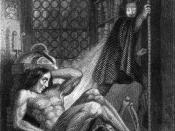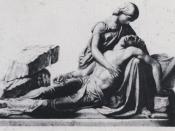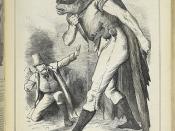Introduction and problem definitionIn this short essay I would like to state thoughts and answer questions concerning the famous book "Frankenstein" by Mary Wollstonecraft Shelley. The story has been a huge influence on the genre of gothic novels, on female writers and on movie makers. Its themes have fascinated the literature scene and inspired other authors. This is why I would like to introduce the main themes leading through the story.
I will focus on the themes of giving birth and creating life, isolation and alienation and family and kinship. I will give a short overview on how these themes still fascinate the readers of this book almost 200 years after it was written.
While reading the book I wanted to find out more about the time and social background the book was written in. In my opinion themes in a story can give you a good overlook of the circumstances in a certain time period.
Interestingly it is also a reflection of modern times' society.
My essay will feature a general overview of the story and characters. This way it will be easier to prepare a context. However I will focus on introducing the themes.
I will end this essay with a conclusion of what I found out about the story, its themes and social circumstances.
In Mary Shelley's Frankenstein a lot of themes are discussed. They appear in almost every line of the book and are represented by descriptions of nature, religion and the people that surround themselves with this. In my opinion the main themes center around the protagonists and their actions. The most human and natural themes such as giving birth and social organizations are in contrast to isolation and loneliness and creating life with the help of science.
Giving birth and creating lifeEven though the main character is a male, he steps into the position of a woman. By calling the process of creating the monster "labour" he literally gives birth to the monster himself- "After so much time spent in painful labour" (1.3.30) But not only has he said: "and the moon gazed on my midnight labours" (1.3.29), he sees his "work-shop of filthy creation"(1.3.8) as a female uterus and returns to the female symbolism of bearing a newborn child. He is not only a deputy of women but at the same time he puts himself in the position of god by deciding whom to give life and death to. At this point it seems unclear to me for what reason he does all this. Woman during this time did not have many rights in general. One of the things that made them irreplaceable was the fact that they were the ones to give birth and life to a new human being. With taking over this part himself, Frankenstein lowered a woman's position in the social life once more. To exaggerate this thought, Frankenstein put woman in the position of being useless and unnecessary in this world in general. If males could give birth or better create life, then what else are women needed for? Mary Shelley probably used this thought to draw attention to her own situation as a female writer and woman herself during the 18th century. Maybe she wanted to put focus on the issue of woman's rights to improve the situation by having people think about what they would do without woman and that they should respect them more. I do not think that it is a coincidence that the word "labor" has two opposite meanings that are both related to hard work.
Since I am a woman myself I obviously believe that even if men were able to create life, the majority of them would never be able to care for a newborn as good as a woman could. Men are not made for developing the feelings a woman will develop as soon as she holds her own child in her hands.
The same issue is addressed by Mary Shelley. Viktor is really excited while creating the monster but as soon as he sees it, he is scared and leaves the monster alone to himself: "but now that I had finished, the beauty of the dream vanished, and breathless horror and disgust filled my heart." (1.4.28) Even when the creature lies in front of Frankenstein's bed, begging to be loved, he leaves him alone- expelled, unsheltered and unloved. Viktor takes no responsibility for the monster and the results of that will follow soon.
I see it as a warning by Shelley that is it what will happen to children that grow up being unloved and expelled. This is one of the points that makes this story still popular today. The issue is the same: especially children who have had a bad childhood are the ones who become violent towards others and themselves.
While reading the story for the second time I started being interested in the time frame the events are happening in. I read several interpretations on the internet and several books and only then did I notice that the three seasons are of about nine month length. This is exactly the amount of time a woman is in her pregnancy. Again this refers to Frankenstein trying to replace the role of woman.
Isolation and AlienationThe next theme I would like to discuss is isolation or alienation. It is a theme that links the monster and Frankenstein that close to each other that this topic of comparing both of them would be enough to write a complete new essay about. Obviously at first it is the monster that seems to be the lonely one. "His yellow skin scarcely covered the work of muscles and arteries beneath ⦠his watery eyes, that seemed almost of the same colour as the dun-white sockets in which they were set, his shrivelled complexion and straight black lips. " (1.4.16ff) The creature is ugly and monstrous but compared to Viktor he did not choose to be lonely himself, he got abandoned by others. The first one to ever give up on him is his creator Viktor. As I mentioned before he leaves the monster alone to himself. Eventually he will experience the next act of abandonment when he enters the village and all people are extremely terrified of him. The monster describes it himself: "but I had hardly placed my foot within the door before the children shrieked, and one of the women fainted."(2.3.20) They throw stones and anything they could find at him and judge him for nothing but his looks.
The next incident where he found himself alone without any chance of ever being loved by others was when he saved a child's life. Even though he performed this act of selflessness, the father of the child still tried to shoot him.
However he will eventually experience the biggest disappointment when meeting the cottagers, the DeLacey family in person. They impressed him with their gentleness, simplicity and everything he ever wanted- human companionship. He even learns their language so that he can reveal his own beauty and gentleness of his soul. He sees a chance in winning their trust by socializing with their blind grandfather. When the younger kids interrupt this meeting, they are scared of him and chase him away. It breaks his heart when he has to learn, that the family completely left their home after seeing the monster. Again he got only judged by his outside appearance and not by his inner qualities.
This is the second point that links this story to modern times. People are faster in judging someone by the way he looks then by his character or personality. The reader feels pity for the monster and at some point even a little bit embarrassed, because this is something we all do. The story reminds us of the qualities by whom we should judge a person or any other being. Looks can change, but the inside of a person will always stay the same.
However being abandoned by others is not the only way to isolate yourself from others. Viktor did the complete opposite. He chose to be lonely.1 He was the one who did not visit his family for month while working on creating the monster: "I must absent myself from all I loved while thus employed." He chose not to tell anybody about the monster. And just like nowadays, if you do not tell anybody about your life, other people will eventually stop telling you about their lives as well and this is how you end up lonely.
1 http://epubl.ltu.se/1402-1773/2006/049/LTU-CUPP-06049-SE.pdfFamily and kinshipAt the beginning of the book the reader learns more about Frankenstein's family situation. The first chapter is primarily concerned with the theme of family and kinship. The absolute need for human contact and emotional ties are stressed here. Many relationships mentioned in this chapter are between caretaker and cared-for: the Frankensteins and Elizabeth, Caroline's father and Caroline, Viktor and Elizabeth and so on. This repeats itself when the monster meets the DeLacey family. The younger ones care for their blind grandfather and sing and tell him stories and you never read anything about an argument or anything whatsoever: "the old ma, who, taking up an instrument, began to play, and to produce sounds, sweeter than the voice of the thrush or the nightingale." (2.3.22)The family in general is idealized and only the ones who do not fit in, either because of their looks, or because of their actions, are completely left out and abandoned. Viktor feels like his family will not understand his study and the monster is left out of the DeLacey family because of his looks. Maybe Shelley wanted to make the point here, that even though family can be a perfect and satisfying place for the ones who fit in, but it can as well seem like a prison for the ones who are left out. You have adapt the fixed patterns, or you will never fit in.
It is quite ironic though, that the ones who never fit in the perfect family, are the ones who die at the end of the story. This is probably an important statement Shelley tried to make. I am not sure though if she either criticized the intolerant rules of the family or if this was an advice for the outsiders in the world. The first thought would, in my opinion, be more fitting, since she, as a female writer, was an outsider as well.
Viktor however gets a second change to fit in when he returns home because of his sickness. He recovers because he left all his work and anything from his old life behind. He now can surround himself with his "perfect family" and receive refuge- at least for a short amount of time.
In contrast to this image of the "perfect family", again, the monster and his creator. Except the fact that Frankenstein created the monster and is thus something like his fatherly figure, they are also so much alike, that it seems absurd that those two do not get along and built a comparable happy family. Throughout the story Shelley pushed the reader in the direction of condemning Viktor for all kinds of actions.
Before Viktor leaves for Ingolstadt his mother dies. Unlike the typical idealistic family is does not seem too sad about it, but he rather flees to the University and leaves his family alone with this faith for several months: "My departure for Ingolstadt, which had been deferred by these events, was now again determined upon."(1.2.30)ConclusionAfter writing this essay and drawing closer attention to the three main themes- giving birth and creating life, isolation and alienation and family and kinship it became clear to me why this story is still very popular nowadays. All of those human characteristic or interaction codes are still as topical now as they were in the 18th century. People are fascinated by the system we live in and the rules and codes we choose for our lives. No matter if we read novels about it, watch movies or shows on TV such as "Die Super Nanny" or "Big Brother". We will never get enough of watching other people's lives and secretly taking part in them.
Shelley wanted the reader to learn from some of the mistakes Frankenstein or other people did. Maybe she even wanted to reflect them upon our lives.
BibliographyShelley, Mary Wollstonecraft (1999) Frankenstein, or the modern Prometheus. The 1818 Text. Ed. James Rieger.Chicago; London: The University of Chicago Press.
Internet sourcesBrännström, Carina (2006) The Analysis of the Theme of Alienation in Mary Shelley's Frankenstein. Lulea University of Technolgy.
http://epubl.ltu.se/1402-1773/2006/049/LTU-CUPP-06049-SE.pdf 2009-1-26http://www.english.upenn.edu/Projects/knarf/contents.html 2009-1-26 Trustees of the University of Pennsylvaniahttp://en.wikipedia.org/wiki/Frankenstein 2009-1-26 Wikipedia, The free Encyclopedia





